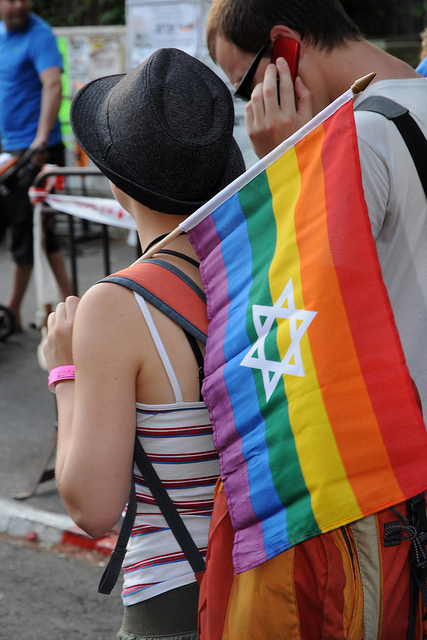
by Julie Sugar
Orthodox Judaism, My Soul is Sick with Love for You

http://www.flickr.com/simplyboaz
On Thursday, the Orthodox Union issued a statement publicly opposing the President’s recent stance on same-sex marriage. I read it that afternoon, got up from my desk, walked into the office bathroom, and cried. If the OU does indeed represent Orthodox Judaism, as they assert, the path towards a more honorable Orthodoxy seemed too long. I conceded to myself that feminism or LGBTQ inclusion within the movement really is an oxymoron, a fantasy. It was time for me to finally break up with Orthodox Judaism.
Yet on Shabbos morning I was back in my Orthodox synagogue, holding the Torah and reading a prayer out loud on behalf of the congregation.
Participating in that part of the service—either reading aloud the prayer for the American government, for the State of Israel, or sometimes both—has been bittersweet because it is an innovative but limited opportunity for women to have an increased role in the ritual space. See, I believe that increased sensitivity and inclusion within the framework of halakha, traditional Jewish law, is not only feasible, it is a communal obligation. While this year I became less observant again (I grew up completely secular), and I haven’t currently been identifying as Orthodox, I have stayed in an Orthodox community because I feel compelled to work from within the movement to increase opportunities for women in the ritual space while remaining within the contours of halakha. Thankfully I am not the only one thus compelled; there are other people, entire organizations, and communities like mine working towards a shared vision of an ever-improving and increasingly inclusive Orthodoxy.
I usually read the prayer for the American government out loud. The prayer itself has never particularly moved me, but this Shabbos as I read, a warm rush of gratitude and pride coursed through me. The familiar words danced and came alive: “May [God] bless, preserve, and guard, help, exalt, and make great, and raise high the President of these United States, and the Vice President,” I read. I thought about Obama and Biden, and the moves they made to support same-sex marriage. I asked aloud for God to instill in their hearts compassion to do good with us. “Let us say amen,” I read, and my community responded with one voice: “amen”. I thought about whoever wrote the OU statement, and wondered how they felt that same morning, hearing those same words in their own community—though presumably not read out loud by a woman. I returned to my seat shaking.
I was a wreck. Sometime between then and the end of services, between half a dozen different bouts of tears as I prayed, it hit me: maybe I am Orthodox. I certainly feel Orthodox communally—perhaps my personal religious practice is just between me and God. Either way, I cannot leave Orthodox Judaism. Not right now. I care too much.
My friends keep asking me why I was so surprised by the OU’s statement. I agree that it’s unsurprising that a leading Orthodox institution opposes same-sex marriage; the topic of same-sex relationships in Orthodoxy is complicated, to say the least, mostly due to legalistic prohibitions stated in the Torah itself. No, it was not surprise I felt, but deep disappointment and disgust. The statement was a slap in the face—due to its utter lack of sensitivity, empathy, and grace, due to its neglect of the issue of prejudice within the Orthodox community, due to its absence of acknowledgement that a community is more than just law and comprises a diverse set of values and individuals.
The OU easily explains themselves: “as Orthodox Jewish leaders”, they write, they are opposed to any kind of effort to alter the (civil!) definition of marriage to include same-sex relationships; however, I know many Orthodox Jewish leaders who would condemn their statement.
To the Orthodox Union, I will try to respond as sensitively as I know how (and I know sensitively):
The values you are advancing are not the complete set of values of the entire Orthodox community. You are not addressing the entire Orthodox community, nor are you speaking for the entire Orthodox community—a community which maybe even includes me.